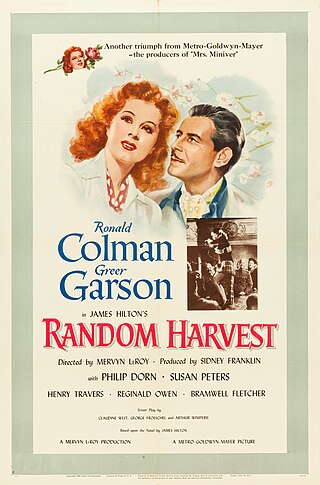
Random Harvest is a 1942 American romantic drama film based on the 1941 James Hilton novel of the same title, directed by Mervyn LeRoy. Claudine West, George Froeschel, and Arthur Wimperis adapted the novel for the screen, and received an Academy Award nomination. The novel keeps the true identity of Paula/Margaret a secret until the very end, something that would have been impossible in a film, where characters’ faces must be seen. This meant that the movie had to take a very different approach to the story. The film stars Ronald Colman as a shellshocked, amnesiac World War I veteran, and Greer Garson as his love interest.

The Talk of the Town is a 1942 American comedy-drama film directed by George Stevens and starring Cary Grant, Jean Arthur, and Ronald Colman, with a supporting cast featuring Edgar Buchanan and Glenda Farrell. The screenplay was written by Irwin Shaw and Sidney Buchman from a story by Sidney Harmon. The picture was released by Columbia Pictures. This was the second time that Grant and Arthur were paired in a film, after Only Angels Have Wings (1939).

Father of the Bride is a 1950 American romantic comedy film directed by Vincente Minnelli from a screenplay by Frances Goodrich and Albert Hackett, based on the 1949 novel of the same name by Edward Streeter. The film stars Spencer Tracy, Joan Bennett, and Elizabeth Taylor, and follows a man trying to cope with preparations for his daughter's wedding. Father of the Bride was nominated for Academy Awards for Best Picture, Best Writing, Screenplay, and Best Actor in a Leading Role.
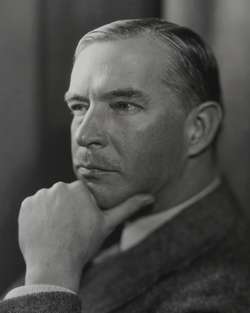
John Phillips Marquand was an American writer. Originally best known for his Mr. Moto spy stories, he achieved popular success and critical respect for his satirical novels, winning a Pulitzer Prize for The Late George Apley in 1938. One of his abiding themes was the confining nature of life in America's upper class and among those who aspired to join it. Marquand treated those whose lives were bound by these unwritten codes with a characteristic mix of respect and satire.

A Double Life is a 1947 American film noir which tells the story of an actor whose mind becomes affected by the character he portrays. It stars Ronald Colman and Signe Hasso. It is directed by George Cukor, with screenplay by Ruth Gordon and Garson Kanin. Ronald Colman won the Academy Award for Best Actor for his performance in this film.

Smash-Up, the Story of a Woman, also called A Woman Destroyed, is a 1947 American drama film with elements of film noir that tells the story of a rising nightclub singer who marries another singer and becomes an alcoholic after sacrificing her career for him.
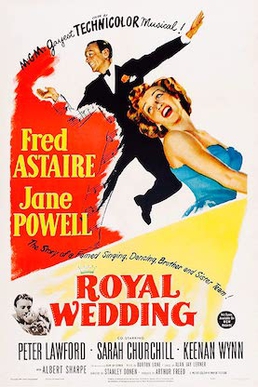
Royal Wedding is a 1951 American musical comedy film directed by Stanley Donen, and starring Fred Astaire and Jane Powell, with music by Burton Lane and lyrics by Alan Jay Lerner. Set in 1947 London at the time of the wedding of Princess Elizabeth and Philip Mountbatten, the film follows an American brother-sister song and dance duo who, while performing, each fall in love — he, with a female dancer, and she, with an impoverished but well-connected nobleman. The film marked Donen's second directorial feature. It was released as Wedding Bells in the United Kingdom.

Allan Marquand was an art historian at Princeton University and a curator of the Princeton University Art Museum. Marquand is notable as one of the foremost art historians and critics of his time, and helped to popularize and establish the field in elite college campuses. Along with his contemporary, Harvard's Charles Eliot Norton, Marquand was the first academic to bring the serious, academic study of art history into American collegiate curricula.

The Great Gatsby is a 1949 American historical romance drama film directed by Elliott Nugent, and produced by Richard Maibaum, from a screenplay by Richard Maibaum and Cyril Hume. The film stars Alan Ladd, Betty Field, Macdonald Carey, Ruth Hussey, and Barry Sullivan, and features Shelley Winters and Howard Da Silva, the latter of whom later returned in the 1974 version. It is based on the 1925 novel The Great Gatsby by F. Scott Fitzgerald. Set during the raucous Jazz Age on Long Island near New York City, the plot follows the exploits of enigmatic millionaire and bootlegger Jay Gatsby who attempts to win back the affections of his former lover Daisy Buchanan with the aid of her second cousin Nick Carraway.

The Catered Affair is a 1956 American comedy drama film directed by Richard Brooks and produced by Sam Zimbalist from a screenplay by Gore Vidal, based on a 1955 television play by Paddy Chayefsky. The film stars Bette Davis, Ernest Borgnine, Debbie Reynolds, Barry Fitzgerald and Rod Taylor. The Catered Affair marked the first appearance of Bette Davis in a Metro-Goldwyn-Mayer picture. It was also Rod Taylor's first film for MGM after signing a long-term contract with the studio. The film score was by André Previn and the cinematographer was John Alton.
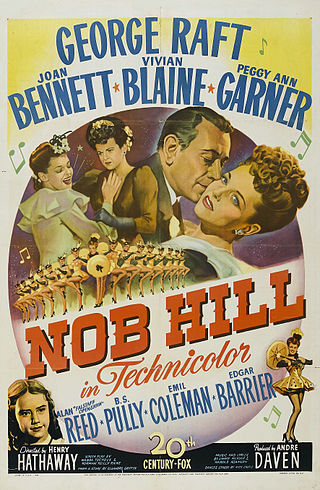
Nob Hill is a 1945 Technicolor film about a Barbary Coast, San Francisco, United States saloon keeper, starring George Raft and Joan Bennett. Part musical and part drama, the movie was directed by Henry Hathaway. It remains one of Raft's lesser known movies even though it was a big success, in part because it was a musical.
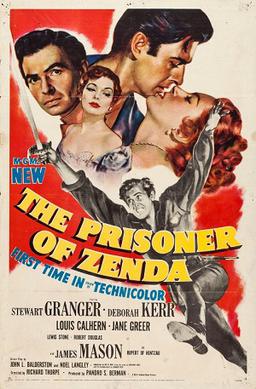
The Prisoner of Zenda is a 1952 American Technicolor adventure film version of the 1894 novel of the same name by Anthony Hope and a remake of the 1937 sound version and the 1922 silent. This first color version, made by Loew's and Metro-Goldwyn-Mayer, was directed by Richard Thorpe and produced by Pandro S. Berman. The film stars Stewart Granger, Deborah Kerr, and James Mason, with Louis Calhern, Robert Douglas, Jane Greer, and Robert Coote in supporting roles.

The Late George Apley is a 1937 novel by John Phillips Marquand. It is a satire of Boston's upper class in the late 19th and early 20th centuries. The title character is a Harvard-educated WASP living on Beacon Hill in downtown Boston. The book is an epistolary novel, made up mostly of letters to and from the title character. It is subtitled "A Novel in the Form of a Memoir", because the letters and other personal documents are quoted by another character, Apley's biographer.
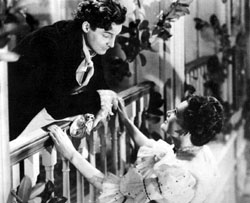
The Young Mr. Pitt is a 1942 British biographical film of the life of William Pitt the Younger and in particular his struggle against revolutionary France and Napoleon. It was directed by Carol Reed and stars Robert Donat, Robert Morley, Phyllis Calvert and John Mills. Made in black-and-white, it was produced by Edward Black and Maurice Ostrer for the British subsidiary of 20th Century Fox.

Three Strangers is a 1946 American film noir crime drama directed by Jean Negulesco and starring Sydney Greenstreet, Geraldine Fitzgerald, and Peter Lorre, and featuring Joan Lorring and Alan Napier. The screenplay was written by John Huston and Howard Koch. It was produced and distributed by Warner Brothers.

Show Boat is a 1951 American musical romantic drama film, based on the 1927 stage musical of the same name by Jerome Kern (music) and Oscar Hammerstein II, and the 1926 novel by Edna Ferber. It was made by MGM, adapted for the screen by John Lee Mahin, produced by Arthur Freed and directed by George Sidney.
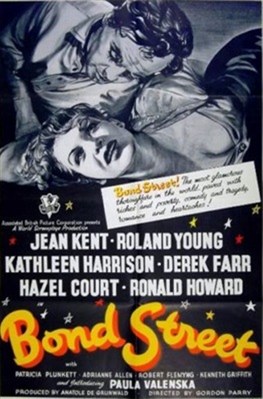
Bond Street is a 1948 British portmanteau drama film directed by Gordon Parry and based on a story by Terence Rattigan. It stars Jean Kent, Roland Young, Kathleen Harrison, and Derek Farr. The film depicts a bride's dress, veil, pearls and flowers purchased in London's Bond Street—and the secret story behind each item.

John Loves Mary is a 1949 comedy film directed by David Butler and written by Henry Ephron and Phoebe Ephron. The film stars Ronald Reagan, Patricia Neal and Jack Carson. The film was released by Warner Bros. on February 19, 1949. It's based on a Broadway play of the same name written by Norman Krasna, which ran from February 4, 1947, to February 7, 1948, at the Booth Theatre and Music Box Theatre in New York City.
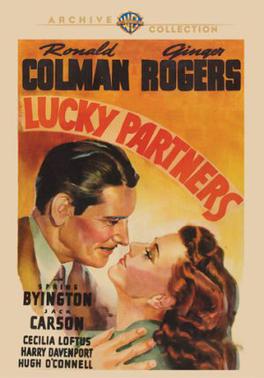
Lucky Partners is a 1940 American romantic comedy film starring Ronald Colman and Ginger Rogers. Directed by Lewis Milestone for RKO Radio Pictures, it is based on the 1935 Sacha Guitry film Good Luck. The picture was the only film pairing of Colman and Rogers, and Rogers' eleventh and final film written by Allan Scott.

My Life with Caroline is a 1941 American comedy film directed by Lewis Milestone and starring Ronald Colman and Anna Lee, in her second Hollywood film and her first in a starring role. The supporting cast featured Charles Winninger, Reginald Gardiner and Gilbert Roland. The screenplay was written by John Van Druten and Arnold Belgard.



















